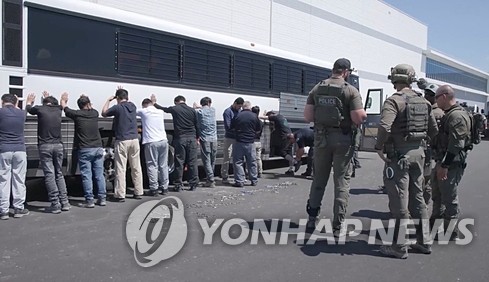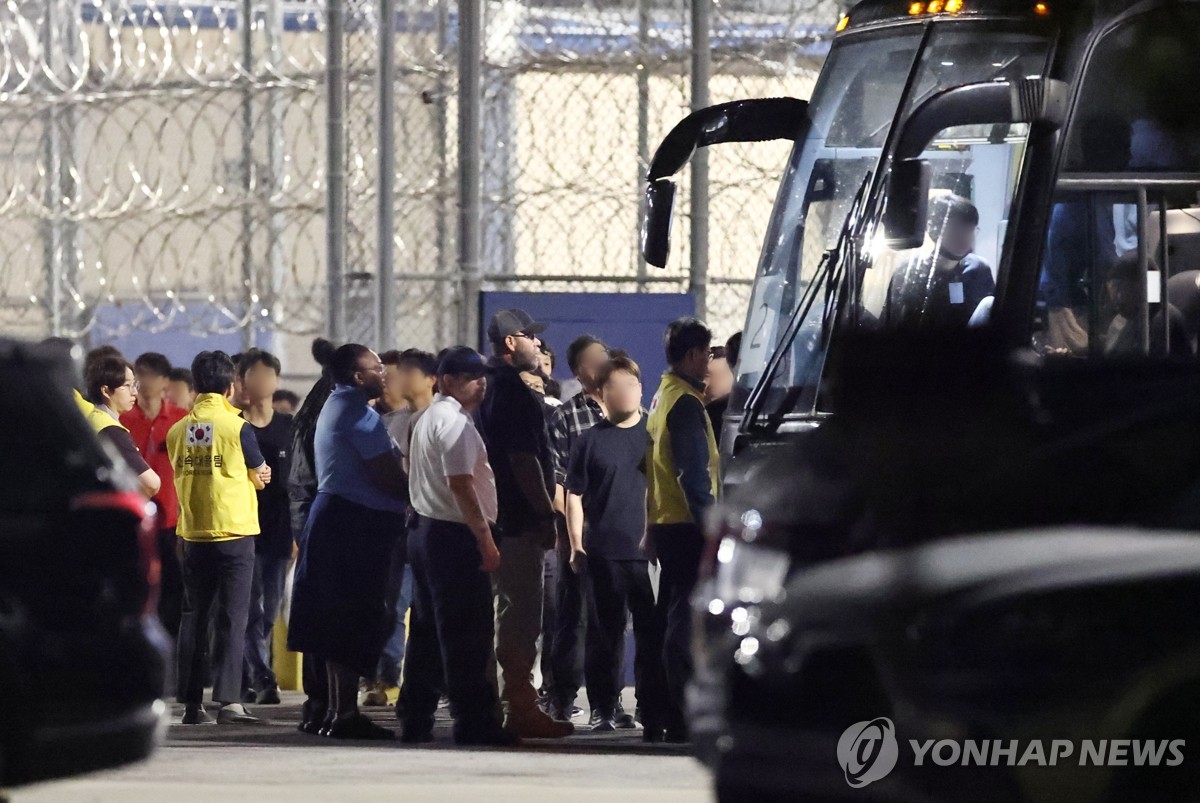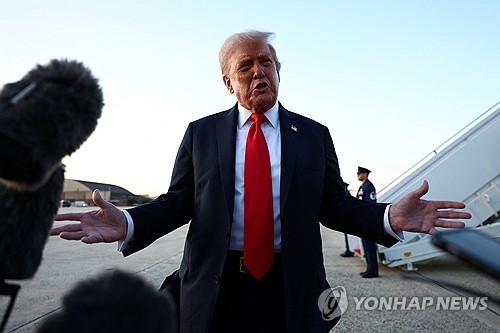
(Washington = Yonhap News) Correspondent Park Seong-min = As Korean workers detained by U.S. immigration authorities were released on the 11th (local time) after a series of twists and turns that delayed their schedule by about a day and returned home on a chartered plane, the two countries of South Korea and the U.S. are now faced with the task of resolving the issues raised by this incident.
The arrest and detention of 300 Koreans working at the construction site of a joint battery plant between Hyundai Motor Group and LG Energy Solution in Georgia on the 4th by U.S. law enforcement authorities caused a huge stir as this was the first time in the history of relations between the two countries that have expanded from a “military alliance” (mutual defense treaty) to an “economic alliance” (free trade agreement).
Even though large-scale crackdowns on illegal immigrants have become routine under the second term of Donald Trump's administration, the fact that the crackdown took place on the campus of Hyundai Motor Group Metaplant America (HMGMA), considered a symbol of investment in the United States, makes it even more shocking.
Voices of anger and concern erupted not only in South Korea but also in the United States as U.S. authorities proudly released footage of a crackdown in which heavily armed agents treated workers on the ground as felons and tied them up in handcuffs and shackles in a coercive atmosphere.
Notably, this crackdown took place just ten days after President Lee Jae-myung and President Donald Trump held a summit in a cordial atmosphere, despite it being their first meeting at the White House.
Therefore, the task of resolving the Korean people's sense of betrayal and insult toward the United States, which has been brought to light by this incident, has emerged as a task that both Korea and the United States must work on together.
Fortunately, President Trump complied with South Korea's strong request by ordering US authorities not to use handcuffs or other physical restraints during the repatriation of South Korean workers. This reinforces the assumption that the US was aware of the negative impact this incident would have on South Korea-US relations and its plans to attract foreign investment.

In addition, the most urgent issue that needs to be resolved is the visa issue for workers dispatched to the United States by companies investing in the United States.
Most of the Korean workers caught in this crackdown were on short-term business visas (B1), short-term tourist visas (B2), or entered the U.S. through the ESTA (Electronic System for Travel Authorization), a type of visa waiver program, and this was considered a violation of immigration law.
In the past, whenever Korean companies invested in the United States, the leaders of both countries would make a loud announcement, emphasizing the development of the alliance and strengthening cooperation. However, behind the scenes, the issue of visas for employees dispatched to the United States was a chronic and unresolved complaint.
Factories already built or currently under construction across the United States, including in Georgia, are facilities that produce cutting-edge products such as semiconductors and batteries, requiring highly skilled workers from the factory construction stage through to subsequent operation.
However, since it is difficult to find such workers in the United States and it is not easy to obtain legal work visas for skilled Korean workers, companies have been using employees who have received ESTA or B1/B2 visas as local workers by sending them on 'illegal business trips' to the United States.
From the perspective of Korean companies, it is now time to abandon this"familiar" practice, as it has become clear that the Trump administration will not simply overlook such detours.
Although President Trump has conveyed to the Korean side his intention to allow the Koreans detained in this incident to remain in the United States and continue working instead of voluntarily leaving the country, it is uncertain when the U.S. immigration authorities, under constant pressure to improve their crackdown on illegal immigrants, will again raid Korean companies investing in the U.S.
The government should also encourage institutionalization in the U.S., such as establishing a new E-4 visa for skilled workers or securing a quota for Koreans on the H-1b visa for foreign workers in specialized occupations, as companies are appealing to the U.S. to address the shortage of skilled workers.
As a result of the recent tariff and trade negotiations between South Korea and the United States, South Korea agreed to invest $350 billion (approximately 486 trillion won) in the United States, resolving the visa issue for South Korean business professionals has become even more urgent.

During his visit to the U.S. to resolve this situation, Foreign Minister Cho Hyun met with U.S. Secretary of State Marco Rubio and proposed the creation of a working group between the diplomatic authorities of the two countries to create a new category of U.S. entry and work visas for Korean professionals. Secretary Rubio sent a positive signal, saying he would actively review the proposal.
The fact that President Trump has properly grasped the root cause of this situation and has shown his will to resolve the visa issue for professional personnel from foreign companies investing in the U.S. also increases the likelihood that Minister Cho's proposal will become a reality.
He said on the social media platform Truth Social on the 7th,"We encourage you to legally bring in very smart people with excellent technical talents and produce world-class products. And we will make it possible for you to do that (bringing in talent) quickly and legally."
Accordingly, visas granted to cutting-edge technology professionals affiliated with foreign companies investing in the U.S., including those from our country, may be expanded, and the likelihood of passage of the"Partner with Korea Act," currently pending in the U.S. Congress, is expected to increase.
The bill, which aims to issue up to 15,000 E-4 visas annually to Koreans with specialized education and skills, has been introduced in every U.S. Congressional session since 2013 under the leadership of Representative Young Kim (R-Calif.), a Korean-American, but has failed to pass. Representative Kim introduced it again in the 119th Congress in July.
However, even if institutionalization and legislation regarding visas for Korean professionals are established, it has become clearer that the Trump administration's primary goal is to expand high-quality jobs in the United States by having Korean professionals legally dispatched to the United States transfer their skills and knowledge to American workers and train them.
President Trump has stressed that"we need to bring in experts and train our people so they (Americans) can do it themselves."
This is a point that requires wise response from Korean companies and the government in the future, as it could result in handing over our unique know-how without any compensation.

